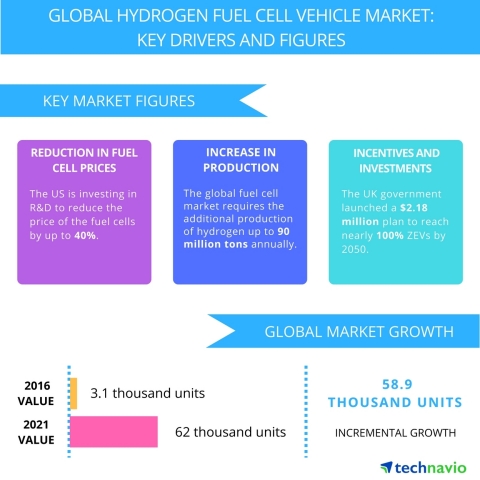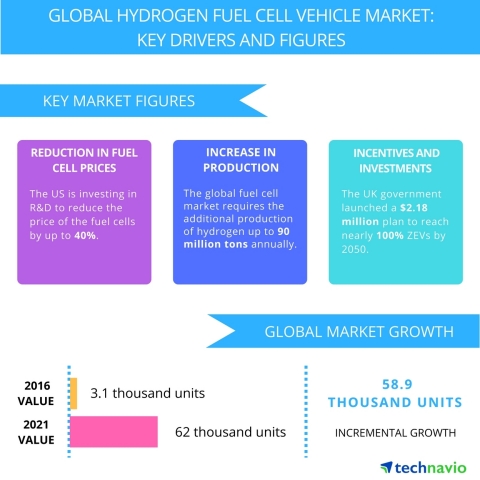LONDON--(BUSINESS WIRE)--Technavio market research analysts forecast the global hydrogen fuel cell vehicle (HCFV) market to grow at a CAGR of more than 82% during the forecast period, according to their latest report.
The market study covers the present scenario and growth prospects of the global hydrogen fuel cell vehicle market for 2017-2021. It also examines the emerging trends and their influence on the current and future markets. The report also presents the vendor landscape and a corresponding detailed analysis of the four prominent vendors operating in the market.
Request a sample report: http://www.technavio.com/request-a-sample?report=56614
Technavio’s sample reports are free of charge and contain multiple sections of the report including the market size and forecast, drivers, challenges, trends, and more.
Technavio automotive analysts highlight the following three market drivers that are contributing to the growth of the global hydrogen fuel cell vehicle market:
- Reduced emission and improved fuel economy
- Development of infrastructure to produce hydrogen
- Incentives and investments by governments
Reduced emission and improved fuel economy
Among the various techniques and solutions to overcome the challenges of GHG emissions, the concept of greener energy is considered significantly. Green energy refers to harnessing energy from renewable resources.
According to Siddharth Jaiswal, a lead analyst at Technavio for automotive manufacturing research, “Fuel cell technology reduces dependency on conventional energy resources and diversifies renewable energy sources. Further, HFCVs allow efficient operation with fewer vibrations and lower levels of noise pollution. A recent study from the National Research Council has revealed that GHG emissions from vehicles have declined owing to the use of HEVs and HFCVs.”
The long-term economic benefit of HFCVs is another driver that is shifting focus toward fuel cell technology. Further, FCs are compact and lightweight, thereby the mileage of these vehicles is considerably higher when compared to plug-in electric vehicles (PEVs).
Development of infrastructure to produce hydrogen
Fuel cell electric vehicles use hydrogen cell as the primary fuel cell. Currently, around 80 million tons of hydrogen is produced each year worldwide at an average price of USD1.75/kg. The global fuel cell market requires an additional production of 90 million tons annually to sustain growth.
Significant investments are being made to scale up the production of hydrogen and develop clean and emission-free hydrogen production technologies. These technologies include thermochemical conversion of fossil fuels to hydrogen by steam methane reforming (SMR) or coal gasification processes with integrated carbon capture and storage units, biomass gasification, and the use of nuclear or renewable energy for water electrolysis.
“The application of fuel cells in fuel cell electric vehicles is directly related to the existence of hydrogen infrastructure. Many initiatives across the globe are driving the growth of the hydrogen infrastructure,” says Siddharth.
Incentives and investments by governments
Currently, most HFCVs in use are being adopted because of the strong push and support from government authorities. Governments of large hydrogen vehicles markets such as Japan, the US, and Europe have come up with incentives and subsidies for private ownership and direct investments for the parallel development of hydrogen infrastructure. For instance, starting from 2014, the government of Japan has been offering tax rebates of more than USD 19 thousand per HFCV purchase.
Although incentives schemes in other countries are not well settled, all major countries are investing funds in R&D of HFCVs and supporting infrastructure development for current and future markets.
Browse Related Reports:
- Global Direct Methanol Fuel Cell Market 2016-2020
- Global Electric Vehicle Market 2016-2020
- Global Unmanned Aerial Vehicle Battery Market 2016-2020
Become a Technavio Insights member and access all three of these reports for a fraction of their original cost. As a Technavio Insights member, you will have immediate access to new reports as they’re published in addition to all 6,000+ existing reports covering segments like automotive services, powertrain, and wheels and tires. This subscription nets you thousands in savings, while staying connected to Technavio’s constant transforming research library, helping you make informed business decisions more efficiently.
About Technavio
Technavio is a leading global technology research and advisory company. The company develops over 2000 pieces of research every year, covering more than 500 technologies across 80 countries. Technavio has about 300 analysts globally who specialize in customized consulting and business research assignments across the latest leading edge technologies.
Technavio analysts employ primary as well as secondary research techniques to ascertain the size and vendor landscape in a range of markets. Analysts obtain information using a combination of bottom-up and top-down approaches, besides using in-house market modeling tools and proprietary databases. They corroborate this data with the data obtained from various market participants and stakeholders across the value chain, including vendors, service providers, distributors, re-sellers, and end-users.
If you are interested in more information, please contact our media team at media@technavio.com.




